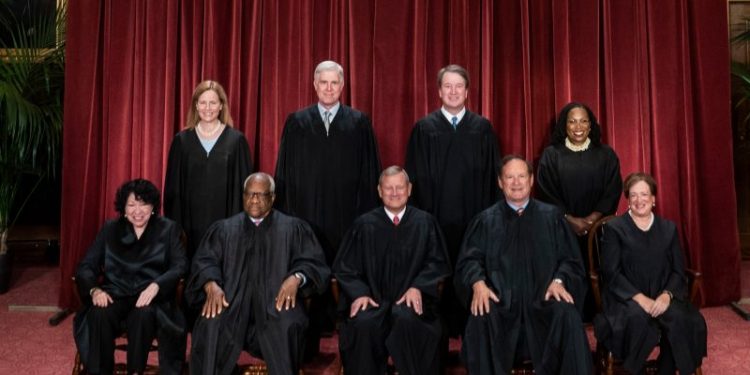The Supreme Court on Friday refused to block a lower court ruling that would revoke the authority of Oklahoma officials to enforce certain laws against Native Americans amid legal confusion over the justices’ 2020 declaration that a large swath of the state remains Indian country.
Two justices suggested in a statement accompanying the order that the city of Tulsa’s request to halt the lower court ruling was premature, and that officials could continue enforcing local laws while the litigation continues.
In a major ruling three years ago, the Supreme Court reclassified most of eastern Oklahoma, including Tulsa, as an American Indian reservation. The decision disrupted criminal prosecutions and led to other legal questions about the power to enforce local laws against Native Americans accused of violating those statutes within a municipality’s limits.
The latest case began with Justin Hooper, a member of the Choctaw Nation who lives in Tulsa. He was ticketed for speeding in the summer of 2018 on land within Tulsa’s borders on the Muscogee (Creek) Nation reservation.
Hooper paid the $150 traffic ticket. But after the Supreme Court’s ruling in McGirt v. Oklahoma two years later, Hooper went to court and argued that the city does not have jurisdiction to prosecute Indians for violations of city law that occur within the reservation boundaries.
Hooper lost the first round in District Court. The U.S. Court of Appeals for the 10th Circuit reversed that ruling in an initial decision, siding with Hooper and sending the case back to the trial court.
There were no noted dissents from the Supreme Court’s order Friday.
Justice Brett M. Kavanaugh, joined by Samuel A. Alito Jr., said in an accompanying statement that the 10th Circuit’s decision does not prohibit Tulsa from “continuing to enforce its municipal laws against all persons, including Indians, as the litigation progresses.”
In response to the court’s order Friday, the city of Tulsa said in a statement: “As indicated by the Justices, the City will continue to seek clarification of these important legal issues with the District Court and, in the meantime, continue to enforce City ordinances against all persons within the City of Tulsa regardless of Indian status. We will also continue to work cooperatively with our tribal partners to protect the health and safety of our shared constituents.”
Tulsa’s lawyers told the justices that the 10th Circuit decision “creates a potentially dangerous situation” there and in other similar cities and towns because laws “enacted for the protection of the health and safety of its residents are only enforceable by the City against some citizens but not others.”
Requiring police officers to consider whether a person is Native American during traffic stops or in the course of addressing other minor offenses such as trespassing or shoplifting will “change every single stop and extend all stops measurably because of the additional inquires an officer will now be required to make.” The questions also apply to city rules related to fire safety and building codes.
Oklahoma Gov. Kevin Stitt (R) also urged the justices to reverse the lower court ruling.
“We must operate under one set of rules, regardless of race, heritage or background, and cannot allow Tulsa and much of the rest of eastern Oklahoma to be turned into a reservation,” he said in a statement.
Lawyers representing several tribes say the city lacks authority over Hooper without clear direction from Congress. They rejected claims that the ruling would lead to widespread disruption, calling such concerns “conjectural, anecdotal and hyperbolic.”
The city, they say, has entered into agreements with Creek and Cherokee nations to refer criminal misdemeanors and felonies for prosecution by the tribes.
“That Tulsa has selectively elected not to adhere to those agreements specifically for traffic offenses renders its claims of irreparable harm hollow and hardly a valid basis for a stay — particularly one that would prolong the City’s illegal exercise of jurisdiction over tribal citizens,” says a brief filed by the Muscogee Nation in support of Hooper.
The 2020 ruling has raised new questions about the Curtis Act of 1898, a federal statute that predates statehood for Oklahoma. The law established a process for cities and towns in former Indian territory to incorporate and laid the groundwork for state governance. The law said “all inhabitants of such cities and towns, without regard to race shall be subject to all laws and ordinances of such city or town governments.”
The question of how it applies to enforcement of local laws against Native Americans is now in play. After its 2020 decision, a divided court followed up last year in finding that state officials have the authority to prosecute non-Indians for crimes against Native Americans within a tribal reservation.
In June, the 10th Circuit unanimously agreed with Hooper’s lawyers that Congress intended for the city’s power to extend only until Oklahoma became the 46th state in 1907. Once Tulsa became part of a state, the court said, it lost jurisdiction over local violations by Native Americans within Indian country.
“Even if Tulsa proves correct that reversing the district court’s decision will lead to disruption, we must base our decision on the plain text” of the statute, wrote Judge Carolyn B. McHugh. “If the system in place in Oklahoma proves untenable, ‘Congress remains free to supplement its statutory directions about the lands in question at any time.’”
The case is City of Tulsa v. Justin Hooper.














